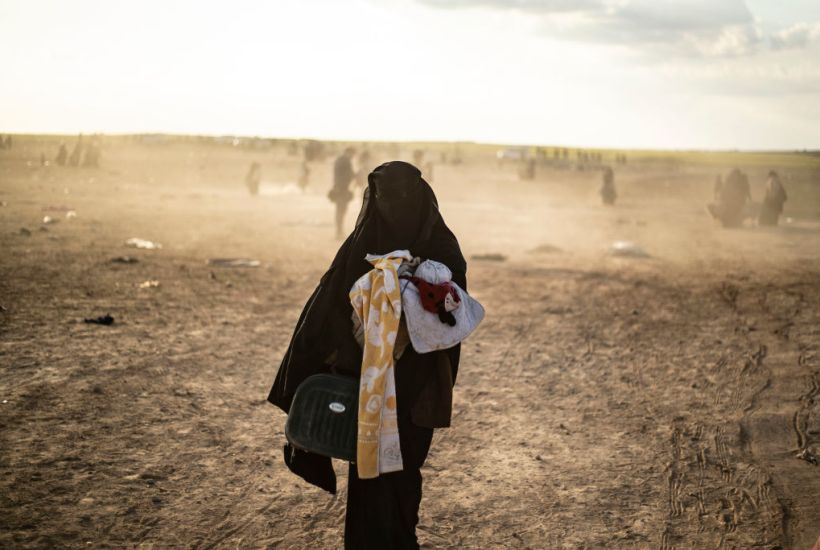Summer 2015. A five-year-old girl is chained up and left outside in the desert sun in Fallujah, Iraq – a punishment for wetting the bed while feeling unwell. The little girl slowly died of thirst in temperatures exceeding 50 degrees Celsius. Condemned to the same inhumane punishment was the girl’s mother, made to endure the additional and unimaginable horror of helplessly watching the life drain from her daughter’s tiny body.
The mother and child were members of Iraq’s Yazidi religious minority. Their captors, members of Islamic State (IS), are said to be German and Iraqi. At the time, Islamic State recruits felt invincible. They taunted the West and ruled over civilians in their territory with cruelty and terror. Four years later, their ‘Caliphate’ had crumbled and the German jihadist, Jennifer W., was facing war crimes charges in her native Munich.
This case set an important precedent, opening the gates for a handful of other charges to be brought against German citizens. The little girl’s mother testified at the trial in Munich: ‘It is very difficult to see your own daughter die in front of your eyes. I want the whole world to know what they have done.’ But the biblical scenes which dominated news cycles when IS first descended on the Yazidis are already fading from memory, and so far, justice for the genocide has not been delivered.
At least 6,000 people from Western Europe abandoned their lives to join Isis’s doomed state-building project, with dozens more from North America and Australasia. Many were killed, but 450 have returned to Britain, 300 to France and 150 to Sweden, whereas several hundred who stuck it out until the end are now stranded in Northern Syria under the watch of Kurdish forces.
So far, the discussions of the fate of these ‘foreign fighters’ has been parochial. Largely absent from an emotive and polarised debate has been the suffering these recruits inflicted on local civilians, none more so than the Yazidi people – whose terrible fate was captured in the chilling words of one UN inquiry:
‘The date of 3 August 2014 would become a dividing line, demarcating when one life ended, and – for those who survived – when another, infinitely more cruel, existence began.’
Many of the international recruits to IS joined after this dividing line, and after the genocide and sexual enslavement of Yazidis was well publicised – mostly by the group’s own grisly propaganda, loudly trumpeting the restoration of a glorious ancient institution.
Troubled by the lack of accountability and debate on their crimes, I wanted to build a more complete picture of the role of Westerners in the genocide. The findings, published by the Counter Extremism Project, are uncomfortable, and point to much more widespread involvement than either debate or court cases indicate.
An American fighter is reported to have prayed and ritually cleansed before and after raping his captive. A Frenchman kept his slave in a house with his mother and two sisters. Brits and Australians bragged about slaves on social media. A German woman is reported to have enslaved a 13-year-old girl before returning home and updating her LinkedIn to settle back into the life she previously abandoned.
Among a network of Yazidi survivors we polled, at least half had contact with Westerners in captivity, despite Western recruits comprising a minority within IS. Some gave details of their rape and torture by British and European captors. One survivor told us of her heartbreak and confusion that Europeans would travel thousands of miles to harm a people they had never met. Others have lost all hope of justice.
Domestically, an infantilising discourse strips jihadist travellers of their agency, as women are labelled ‘brides’ and we speculate over their supposed manipulation into joining such a bloodthirsty cause. Yet according to Yazidi testimony, the Isis women could be just as vicious as men. In some cases, these ‘brides’ prepared Yazidi women for rape: applying makeup, choosing outfits; even chaining their helpless victims down to thwart resistance. Notably, all of the German jihadists charged for war crimes are women.
As the fate of hundreds of Westerners hangs in the balance in Northern Syria, governments must investigate whether crimes against humanity were committed by their own citizens. This is not only a moral and legal imperative, it can be effective counter-terrorism. It could help to secure longer sentences and ease the burden on overwhelmed security services.
Several hundred people have already returned to Europe and been able to pick up their lives, while the communities they devastated in Iraq and Syria will not recover for generations, if at all. Above all, we must not send the message to future extremists that it is possible to travel overseas to rape, oppress and kill people already less fortunate, only to return when the going gets tough to little or no sanction. As a great man once wrote from jail: Injustice anywhere is a threat to justice everywhere.
Got something to add? Join the discussion and comment below.
Get 10 issues for just $10
Subscribe to The Spectator Australia today for the next 10 magazine issues, plus full online access, for just $10.




















Comments
Don't miss out
Join the conversation with other Spectator Australia readers. Subscribe to leave a comment.
SUBSCRIBEAlready a subscriber? Log in